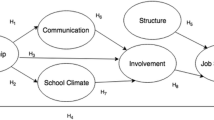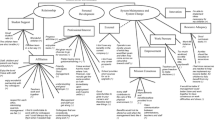Abstract
The main objective of this study was to examine the job satisfaction levels of Jordanian kindergarten teachers in relation to work-related dimensions and socio-demographic variables. The sample consisted of 264 randomly selected teachers working in private kindergartens in Amman. To meet the study’s objectives, a two part questionnaire was developed soliciting information about (1) teachers’ age, marital status, and level of education, and (2) level of satisfaction with the physical environment, school relations, working conditions, children’s behavior, and parent participation. The findings of this study revealed that Jordan’s kindergarten teachers experience an overall average level of job satisfaction. While teachers were highly satisfied with their kindergarten classroom physical environments and their relationships within the school, teachers reported average satisfaction levels with their working conditions, children’s social behaviors, and parent participation. Significant relations were found between teachers’ personal-related dimensions and job satisfaction. Several recommendations are made including a call for regulating the working conditions in the kindergarten private sector in accordance with existing international policies that promote teachers’ job satisfaction.
Similar content being viewed by others
References
Aamondt, M. G. (2004). Applied industrial/organisational psychology (4th ed.). Belmont, CA: Wadsworth/Thomson Learning.
Bagraim, J. J. (2003). The nature of measurement of multiple commitment foci amongst South African knowledge workers. Management Dynamics, 12(2), 13–23.
Bakker, A. B., & Schaufeli, W. B. (2000). Burnout contagion processes among teachers. Journal of Applied Social Psychology, 30, 2289–2308.
Barnett, W. S. (2004). The value of effective preschool education. New York: National Institute of Early Education Research.
Begley, T. M., & Czajka, J. M. (1993). Panel analysis of the moderating effects of commitment on job satisfaction, intent to quit and health following organizational change. Journal of Applied Psychology, 78(4), 552–556.
Belcastro, B. R., & Koeske, G. F. (1996). Job satisfaction and intention to seek graduate education. Journal of Social Work Education, 32(3), 315–328.
Blood, G. W., Ridenour, J. S., Thomas, E. A., Qualls, C. D., & Hammer, C. S. (2002). Predicting job satisfaction among speech-language pathologists working in public schools. Language, Speech and Hearing Services in Schools, 33, 282–290.
Buitendach, J. H., & De Witte, H. (2005). Job insecurity, extrinsic and intrinsic job satisfaction and affective organisational commitment of maintenance workers in a parastatal. South African Journal of Business Management, 36(2), 27–37.
Chiu-Yueh, T. (2000). A study on the relationship among organizational commitment, job satisfaction and organizational citizenship behaviour of nursing personnel. Master’s thesis, Department of Human Resource Management. Retrieved 23rd January 2010 from http://etd.lib.nsusu. edu.tw/ETD_db/ETDsearch/ view_ etd? URN = etd-0725101-002148.
Clark, A. E. (1996). Job satisfaction in Britain. British Journal of Industrial Relations, 34, 189–217.
Committee on Early Childhood, Adoption, and Dependent Care, (2005). Quality early education and child care from birth to kindergarten: Policy statement. Pediatrics, 115(1), 187–191.
Crossman, A., & Harris, P. (2006). Job satisfaction of secondary school teachers. Educational Management Administration Leadership, 34(1), 29–46.
Darling-Hammond, L. (2003). Keeping good teachers: Why it matters, what leaders can do? Educational Leadership, 60(8), 6–13.
DeVoe, J. F., Peter, K., Kaufman, P., Miller, A., Noonan, M., & Snyder, T. D. (2004). Indicators of school crime and safety. Washington, DC: National Center for Educational Statistics.
Drafke, M. W., & Kossen, S. (2002). The human side of organization (8th ed.). Upper Saddle River, NJ: Prentice Hall.
Graham, G. H. (1982). Understanding human relations—The individual, organisations, and management. Chicago, IL: Science Research Associates Inc.
Guarino, C. M., Santibanez, L., & Daley, G. A. (2006). Teacher recruitment and retention: A review of the recent empirical literature. Review of Educational Research, 76(2), 173–208.
Hastings, R. P., & Bham, M. S. (2003). The relationship between student behaviour and patterns and teacher burnout. School Psychology International, 24, 115–127.
Herzberg, F. I. (2003). One more time: How do you motivate employees? Harvard Business Review, 81(1), 87–96.
Hoppock, R. (1935). Job satisfaction. New York, NY: Harper.
Ingersoll, R. M. (2001). Teacher turnover and teacher shortages. American Educational Research Journal, 38(3), 499–534.
Johnson, G. J., & Johnson, W. R. (2000). Perceived over qualification and dimensions of job satisfaction: A longitudinal analysis. Journal of Psychology, 34(5), 537–556.
Kamal, D. (2000). The relation of job satisfaction, self-esteem, and mental health: The case study of kindergarten teaching staff in affiliation with Tehran University. Journal of Psychology and Education, 5(1), 76–98.
Kane, R. G., & Mallon, M. (2006). Perceptions of teachers and teaching. Wellington: Ministry of Education and New Zealand Teachers’ Council. A research report to the Ministry of Education and the New Zealand Teachers Council.
Kilgallon, P., Maloney, C., & Lock, G. (2008). Early childhood teachers’ sustainment in the classroom. Australian Journal of Teacher Education, 33(2), 40–54.
Kyriacou, S., Kunc, R., Stephens, P., & Hultgren, A. (2003). Student teachers’ expectations of teaching as a career in England and Norway. Educational Review, 55, 255–263.
Hargreaves, L. Cunningham, M., Everton, T., Hansen, A., Hopper, B., McIntyre, D., Oliver, C., Pell, T., Rouse, M. and Turner, P. (2007). The status of teachers and the teaching profession: Views from inside and outside the profession. DfES Research Report, 831A.
Lee, M. (2006). What makes a difference between two schools? Teacher job satisfaction and educational outcomes. International Education Journal, 7(5), 642–650.
Li-Grining, C. P., & Coley, R. L. (2006). Child care experiences in low-income communities: Developmental quality and maternal views. Early Childhood Research Quarterly, 21(2), 125–141.
Locke, E. A. (1976). The nature and causes of job satisfaction. In M. D. Dunnette (Ed.), Handbook of industrial and organizational psychology (pp. 1297–1349). Chicago, IL: Rand McNally.
Markiewicz, D., Devine, I., & Kausilas, D. (2000). Friendships of women and men at work: Job satisfaction and resource implications. Journal of Managerial Psychology, 15(2), 161–184.
Maslow, A. H. (1943). A theory of human motivation. Psychological Review, 50, 370–396.
McGrath, D. J., & Princiotta, D. (2005). Private school teacher turnover and teacher perceptions of school organizational characteristics. NCES 2005–061. Washington, DC: National Center for Education Statistics.
Morris, M. (2004). The public school as workplace: The principal as a key element in teacher satisfaction. Los Angeles: California University.
Morrison, K. A. (2004). How franchise job satisfaction and personality affects performance, organisational commitment, franchisor relations, and intention to remain. Journal of Small Business Management, 35(3), 39–68.
Mowday, R. T., & Sutton, R. I. (1993). Organisational behaviour: Linking individuals and groups to organisational context. Annual Review of Psychology, 2, 195–229.
Nores, M., & Barnett, W. S. (2009). Benefits of early childhood interventions across the world: Investing in the very young. Economics of Education Review, 29(2), 271–282.
Olivier, M. A., & Venter, D. J. (2003). The extent and causes of stress in teachers in the George region. South African Journal of Education, 23(3), 186–192.
Palenzuela, S. M. (2004). Measuring pre-kindergarten teachers’ perceptions: Compliance with the high/scope program. Journal of Research in Childhood Education, 18(4), 55–68.
Perie, M., Baker, D., & Whitener, S. (1997). Job satisfaction among America’s teachers: Effects of workplace conditions, background characteristics, and teacher compensation. Washington, D.C.: National Center for Education Statistics, U.S. Department of Education.
Reynolds, A. J., Wang, M. C., & Walberg, H. J. (2003). Early childhood programs for a new century. Washington, DC: Child Welfare League of America.
Riordan, C. M., & Griffeth, R. W. (1995). The opportunity for friendship in the workplace: An underexplored construct. Journal of Business and Psychology, 10(2), 141–158.
Russ, S., Chiang, B., Rylance, B. J., & Bongers, J. (2001). Caseload in special education: An integration of research findings. Exceptional Children, 67, 161–172.
Sargent, T., & Hannum, E. (2003). Keeping teachers happy: Job satisfaction among primary school teachers in rural China. Paper prepared for the International Sociology Association Research Committee on Social Stratification and Mobility (RC28), New York University, NY.
Schlechty, P. C., & Vance, V. S. (1983). Recruitment, selection and retention: The shape of the teaching force. The Elementary School Journal, 83(4), 468–487.
Scott, C., Stone, B., & Dinham, S. (2001). “‘I love teaching but….’ International patterns of discontent” Education Policy Analysis Archives, 9(28), retrieved on-line http://epaa.asu.edu/epaa/v9n28.html .
Spear, M., Gould, K., & Lee, B. (2000). Who would be a teacher?. A review of factors motivating and demotivating prospective and practicing teachers, Slough: NFER.
Spector, P. E. (1996). Industrial and organizational psychology: Research and practice. New York, NY: John Wiley.
Syptak, J. M., Marsland, D. W., & Ulmer, D. (1999). Job satisfaction: Putting theory into practice. Family Practice Management, 9, 26–30.
Tharenou, P. (1993). A test of reciprocal causality of absenteeism. Journal of Organisational Behaviour, 14, 269–290.
Vroom, V. H. (1964). Work and motivation. New York, NY: Wiley.
Wong, Y. (2011). Relationships between kindergarten teachers’ demographic characteristics and subjective well-being: An exploratory study in Hong Kong. Paper presented at the Pacific Early Childhood Education Research Association (PECERA) 12th Conference: Evidence based practice in early childhood care and education, Kobe, Japan. http://repository.ied.edu.hk/dspace/handle/2260.2/11965.
Zembylas, M., & Papanastasiou, E. C. (2005). Modeling teacher empowerment. The role of teacher satisfaction. Educational Research and Evaluation, 11(5), 433–459.
Author information
Authors and Affiliations
Corresponding author
Rights and permissions
About this article
Cite this article
Abu Taleb, T.F. Job Satisfaction Among Jordan’s Kindergarten Teachers: Effects of Workplace Conditions and Demographic Characteristics. Early Childhood Educ J 41, 143–152 (2013). https://doi.org/10.1007/s10643-012-0526-9
Published:
Issue Date:
DOI: https://doi.org/10.1007/s10643-012-0526-9




